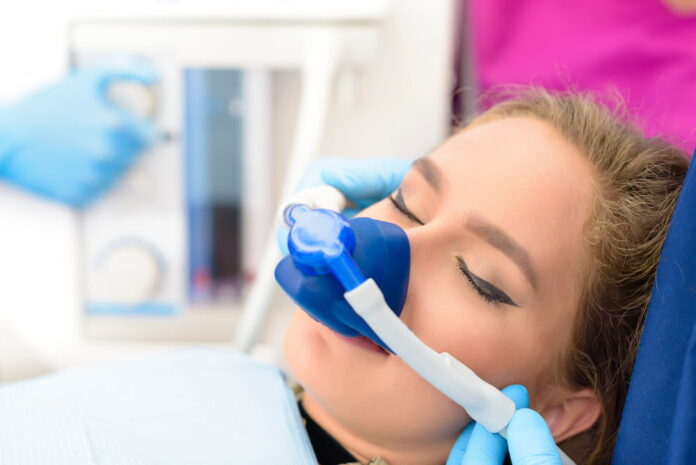Imagine undergoing dental procedures while asleep and relaxed. After waking up, you have little or no memory of what happened during the treatment. The process is also painless and comfortable. Cool! Right? All this is possible with sleep sedation. This treatment makes dental procedures quick and bearable, especially for children and people with dental anxiety.
Suppose you’d love to live the experience. Continue reading to learn more about sleep sedation.
1- How It Works
Medication used to facilitate sleep during dental procedures modifies nerve communications from the central nervous system to the brain. These drugs calm your body by slowing brain activity. Sedatives cause a transmitter known as gamma-aminobutyric acid (GABA), which slows down brain activity, to overwork. Once GABA works overtime in the central nervous system, sedatives allow this transmitter to interfere with brain activity, leading to sleep.
During the sleep sedation procedure, your dentist will require you to use minimal sedation administered as laughing gas or nitrous oxide, moderate sedation taken orally, or deep sedation given by an IV drip. Minimal sedation helps the patient relax but keeps them awake during the dental procedure they’re undergoing.
The patient can also understand and answer questions asked by their dentist. This type of sedation is commonly used when the patient is required to get involved with the treatment.
As far as a moderate sedative is concerned, it makes you feel drowsy and might make you sleep during the procedure. You might or might not remember what transpired after waking up. On the other hand, deep sedation helps you stay asleep during the entire process. However, you remain conscious but might not remember what happened during the treatment.
2- When Is Sleep Sedation Necessary?
There are many reasons why you might need sleep sedation. First, sleep sedation is your ideal treatment if you’re scared of needles getting closer to your gums. Also, if you experience dental anxiety, sleep sedation could be necessary.
As stated earlier, this procedure calms or puts you to sleep to facilitate successful dental procedures without awakening your emotional or physical response.
3- The Procedures That Qualify For Sleep Sedation
Sleep sedation can be used during extensive and minor dental procedures. Your dentist could prescribe sleep sedation for minor procedures like typical preventive care or complex treatments like dental implant surgery, depending on your level of dental anxiety.
However, more extensive dental procedures such as pulpal therapy and root canals qualify for sleep sedation since they’re lengthy and a bit painful.
If you require such treatment, you might need to consider sleep sedation, whether or not you experience anxiety. This treatment makes procedures bearable and less painful.
Suppose your child is undergoing a dental procedure. They might not need sleep sedation for minor care like routine cleaning, especially if they aren’t scared of dental procedures.
However, opting for sleep sedation could be best if they experience anxiety or have special needs. Again, as earlier stated, sleep sedation is safe when administered correctly by a professional.
4- Its Side Effects
Sleep sedation has short- and long-term side effects, like many medical procedures. Among the short-lived side effects are:
– Dizziness
– Sleepiness
– Slow breathing
– Blurred vision
– Impaired perception
– Slow Reaction
Long-term side effects associated with sleep sedation include:
– Loss of memory
– Mental health issues like anxiety
– Liver dysfunction
– Fatigue and feeling hopelessness
– Sedative dependence
While long-term side effects sound severe, your dentist will do everything possible to facilitate successful sedative administration and prevent the development of adverse effects.
5- Is Sleep Sedation Safe?
Sleep sedation is safe for both children and adults. This is even true since a dentist uses a type of sedation ideal for a particular individual.
To enhance sleep sedation further, your dentist will refer to your current state of health and medical history when considering which sedatives suit you. Your dentist will monitor you closely during the procedure to ensure everything goes as planned.
6- Benefits Of Sleep Sedation
Besides side effects, sleep sedation comes with the following advantages:
Relieves anxiety:
This treatment helps patients to feel calm or fall asleep during dental procedures. This ensures those who experience dental anxiety feel comfortable throughout the process.
Pain relief:
No one would want to undergo a painful dental procedure. Sleep sedation prevents one from feeling pain due to the use of strong sedatives.
Helps dentists to work faster:
When a patient is calm or asleep, they don’t interfere with dental procedures, reducing the treatment’s timeline.
Read Also
- Why comprehensive health insurance with maternity is beneficial in the UAEWelcoming a child is a significant milestone in any family’s journey. As exciting as this chapter is, it also brings with it a fair share of responsibilities—especially when it comes to planning for healthcare costs. Health insurance is now mandatory in the UAE, but as with any type of insurance, the smallest requirement might not… Read more: Why comprehensive health insurance with maternity is beneficial in the UAE
- Modern Approaches to Adolescent Mental Health Treatment for Lasting RecoveryWith increasing numbers of teens experiencing emotional and behavioral health concerns, adolescent mental health treatment has become more essential than ever. Conditions such as anxiety, depression, trauma and mood instability are on the rise, and effective support must evolve with these growing needs. Today’s treatment models blend evidence-based therapy with flexible access and holistic care, giving… Read more: Modern Approaches to Adolescent Mental Health Treatment for Lasting Recovery
- How to Find a 5-Star Dentist Near YouChoosing a dentist is more than just finding someone who can clean your teeth. It’s about selecting a trusted partner in your long-term oral health. A 5-star dentist not only provides excellent clinical care but also delivers a positive patient experience, from the moment you walk in until the moment you leave. Whether you’re new… Read more: How to Find a 5-Star Dentist Near You
- Your Easy-Peasy Guide to Brewing Amazing MatchaHey there! So, you’ve heard all the buzz about matcha – that vibrant green powder that’s not just pretty but packed with good stuff? It can seem a little fancy and intimidating at first, but trust me, making a delicious cup at home is simpler than you think. Forget complicated ceremonies for now; let’s just… Read more: Your Easy-Peasy Guide to Brewing Amazing Matcha
- Embracing Holistic Wellness: Insights from a Lansing, MI Health CenterReframing Health: Moving Beyond Symptom Management Treating only symptoms often offers quick relief, yet long-term results stay out of reach. When care zeroes in on isolated complaints, the bigger picture, such as stress, behavior, or lifestyle, often gets missed. Research shows that whole-person care, which looks at physical, emotional, and environmental factors, yields better outcomes… Read more: Embracing Holistic Wellness: Insights from a Lansing, MI Health Center






